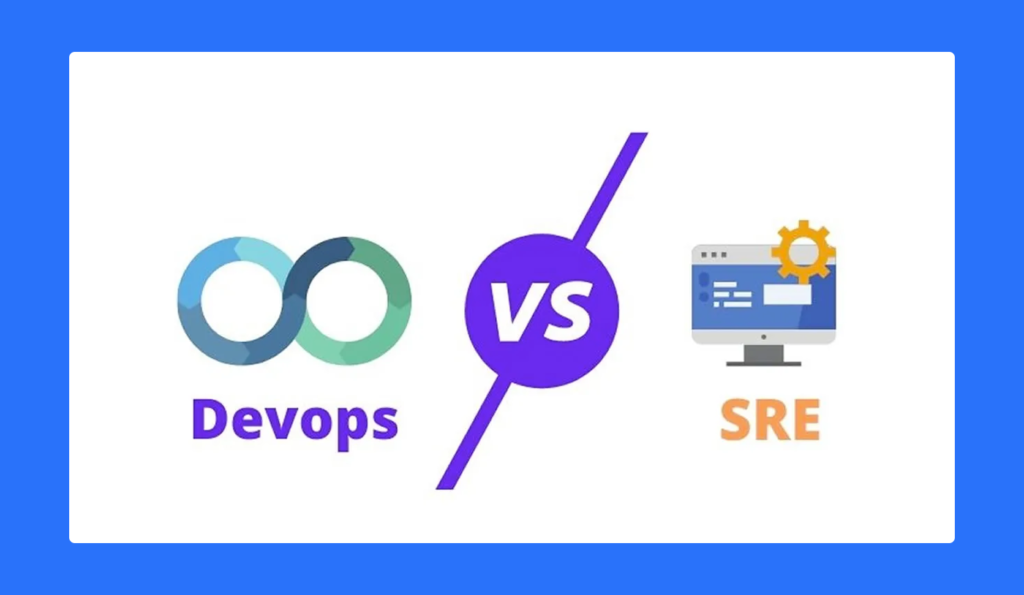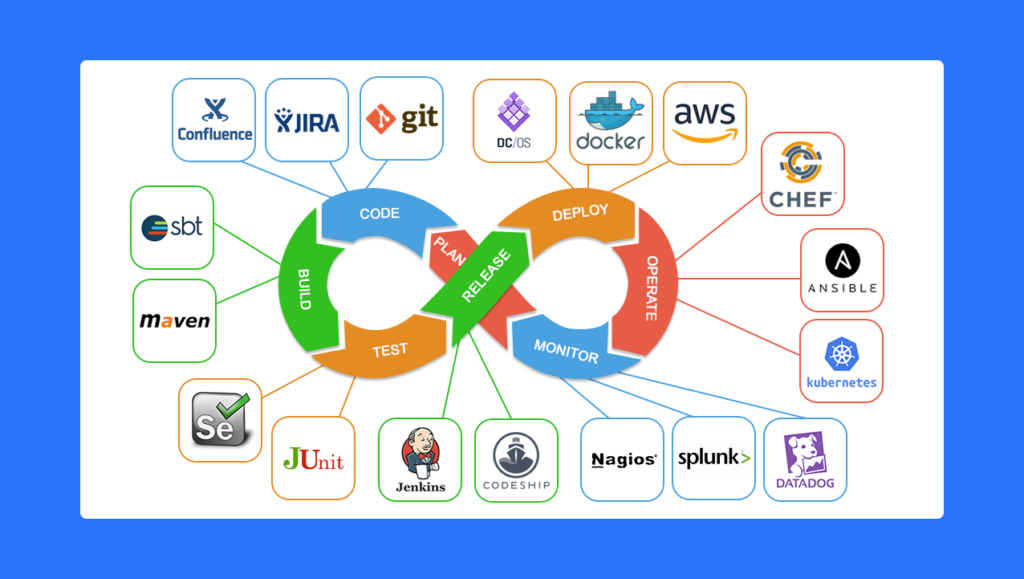In today’s fast-paced technology landscape, organizations are constantly looking for ways to improve their software development and delivery processes. Two practices that have gained popularity in recent years are Site Reliability Engineering (SRE) and DevOps. While both SRE and DevOps share some similarities in their approach, they also have distinct differences. The purpose of this article is to explore the similarities and differences between SRE and DevOps and to understand how they can complement each other to improve the overall performance and reliability of an organization’s software systems.

SRE is a practice that aims to ensure the reliability, availability, and performance of an organization’s software systems. It was first introduced by Google in 2003 and has since been adopted by many other organizations. The main goal of SRE is to ensure that software systems are running smoothly and efficiently and that any issues are identified and resolved quickly. SRE teams typically focus on monitoring, troubleshooting, and automating software systems, as well as implementing best practices for reliability and availability.
DevOps, on the other hand, is a culture and mindset that emphasizes collaboration and communication between development and operations teams. The goal of DevOps is to improve the speed and efficiency of software delivery by breaking down silos between development and operations teams. DevOps teams typically focus on automating and streamlining the software delivery process, as well as implementing best practices for collaboration and communication.
In this article, we will take a deeper look into the similarities and differences between SRE and DevOps, and how they can work together to improve the performance and reliability of an organization’s software systems. We will explore the key principles, goals, and focus of both SRE and DevOps and how they can be implemented to create a more efficient and effective software delivery process. By understanding the similarities and differences between SRE and DevOps, organizations can make informed decisions on how to best implement these practices within their own environments and improve the overall performance and reliability of their software systems.
Table of Contents
What is SRE?
Site Reliability Engineering (SRE) is a practice that aims to ensure the reliability, availability, and performance of an organization’s software systems. The term was first introduced by Google in 2003 and has since been adopted by many other organizations.

SRE is a set of principles, practices, and methodologies that are designed to improve the reliability, availability, and performance of software systems. Some key principles of SRE include:
- Automation: SRE teams use automation to streamline and standardize processes, reduce human error, and increase efficiency.
- Monitoring and observability: SRE teams use monitoring tools to collect and analyze data on the performance and availability of software systems.
- Incident management: SRE teams have a well-defined incident management process in place to respond to and resolve issues quickly and efficiently.
- Change management: SRE teams implement best practices for change management to ensure that changes to software systems are made in a controlled and predictable manner.
One of the main focuses of SRE is on reliability and availability. SRE teams strive to ensure that software systems are running smoothly and efficiently and that any issues are identified and resolved quickly. This includes implementing best practices for reliability and availability, such as redundancy and failover, as well as monitoring and analyzing data to identify potential issues and proactively address them.
Additionally, SRE teams also work closely with development teams to ensure that software systems are designed, developed, and deployed in a way that supports the goals of reliability and availability. In summary, SRE is a practice that aims to ensure the reliability, availability, and performance of an organization’s software systems, by implementing best practices, monitoring, and automation.
What is DevOps?
DevOps is a culture and mindset that emphasizes collaboration and communication between development and operations teams. The goal of DevOps is to improve the speed and efficiency of software delivery by breaking down silos between development and operations teams.

The term DevOps is a combination of “development” and “operations” and it represents the idea of bringing two teams together to work towards a common goal of delivering software faster and more efficiently.
Some key principles of DevOps include:
- Automation: DevOps teams use automation to streamline and standardize the software delivery process, including building, testing, and deploying software.
- Continuous integration and continuous delivery (CI/CD): DevOps teams use CI/CD practices to automate the software delivery process and improve the speed and efficiency of software delivery.
- Collaboration: DevOps teams emphasize the importance of collaboration and communication between development and operations teams, breaking down silos and working together to achieve a common goal.
- Monitoring and observability: DevOps teams use monitoring tools to collect and analyze data on the performance and availability of software systems, and to identify and resolve issues quickly.
DevOps’ focus is on collaboration and automation, and its main goal is to improve the speed and efficiency of software delivery by breaking down silos between development and operations teams. DevOps teams strive to implement best practices for collaboration, automation, and monitoring, and work together to achieve a common goal of delivering software faster and more efficiently.
Similarities between SRE and DevOps
SRE and DevOps are two practices that have gained popularity in recent years and share some similarities in their approach. Both practices have a common goal of improving the software delivery process, and both practices use automation and monitoring tools to achieve this goal. Additionally, both practices also emphasize the importance of collaboration and communication.
- Both SRE and DevOps focus on improving the software delivery process:
- SRE teams work to ensure the reliability, availability, and performance of software systems.
- DevOps teams work to improve the speed and efficiency of software delivery.
- Both practices aim to improve the overall performance and reliability of an organization’s software systems.
- Both SRE and DevOps use automation and monitoring tools:
- SRE teams use automation to streamline and standardize processes, reduce human error, and increase efficiency.
- DevOps teams use automation to streamline and standardize the software delivery process, including building, testing, and deploying software.
- Both SRE and DevOps teams use monitoring tools to collect and analyze data on the performance and availability of software systems and to identify and resolve issues quickly.
- Both SRE and DevOps emphasize the importance of collaboration and communication:
- SRE teams work closely with development teams to ensure that software systems are designed, developed, and deployed in a way that supports the goals of reliability and availability.
- DevOps teams emphasize the importance of collaboration and communication between development and operations teams, breaking down silos and working together to achieve a common goal.
Differences between SRE and DevOps
While SRE and DevOps share some similarities in their approach, they also have distinct differences. These differences can be seen in their focus, roles and practices, and overall goals.
- SRE’s emphasis is on reliability and availability, while DevOps focuses on faster delivery:
- SRE teams work to ensure the reliability, availability, and performance of software systems.
- DevOps teams work to improve the speed and efficiency of software delivery, by automating and streamlining the software delivery process.
- SRE teams focus on maintaining and improving existing systems, while DevOps teams focus on creating new systems quickly and efficiently.
- SRE is more of a role and practice, while DevOps is more of a culture and mindset:
- SRE is a role that is responsible for maintaining and improving software systems.
- DevOps is a culture and mindset that emphasizes collaboration and communication between development and operations teams.
- SRE is more of a set of principles, practices, and methodologies, while DevOps is more of a cultural and mindset shift.
- SRE is more focused on maintaining and improving existing systems, while DevOps is more focused on creating new systems:
- SRE teams focus on maintaining and improving the software systems that are critical to an organization’s operations.
- DevOps teams focus on breaking down silos between development and operations teams and working together to achieve a common goal of delivering software faster and more efficiently.
- SRE teams focus on implementing best practices, monitoring, and automation to improve the reliability and availability of software systems, while DevOps teams focus on automating and streamlining the software delivery process.
Conclusion
In conclusion, SRE and DevOps are two practices that have gained popularity in recent years, both practices have a common goal of improving the software delivery process. While both practices share some similarities, such as the use of automation and monitoring tools, and the emphasis on collaboration and communication, they also have distinct differences. SRE teams focus on maintaining and improving the software systems that are critical to an organization’s operations, while DevOps teams focus on breaking down silos between development and operations teams and working together to achieve a common goal of delivering software faster and more efficiently.
Implementing both practices together can bring a lot of benefits to an organization, SRE can bring stability and reliability to the software systems, while DevOps can bring efficiency and speed to the software delivery process. By understanding the similarities and differences between SRE and DevOps, organizations can make informed decisions on how to best implement these practices within their own environments, and improve the overall performance and reliability of their software systems.
In short, SRE and DevOps are different but complementing practices that when implemented together, organizations can achieve a more efficient and effective software delivery process. It’s important for organizations to understand the similarities and differences between SRE and DevOps, and make informed decisions on how to best implement these practices within their own environments.
FAQ
What is SRE?
SRE stands for Site Reliability Engineering. It is a practice of ensuring the reliability, availability, and performance of software systems. SRE teams work closely with development teams to ensure that software systems are designed, developed, and deployed in a way that supports the goals of reliability and availability. They use automation, monitoring and incident management processes to streamline and standardize processes, reduce human error, and increase efficiency.
What is DevOps?
DevOps is a culture and mindset that emphasizes the collaboration and communication between development and operations teams. The goal of DevOps is to improve the speed and efficiency of software delivery by breaking down silos between development and operations teams. DevOps teams use automation, CI/CD practices, and monitoring tools to streamline and standardize the software delivery process and improve the speed and efficiency of software delivery.
How are SRE and DevOps similar?
Both SRE and DevOps have a common goal of improving the software delivery process. Both practices use automation and monitoring tools to achieve this goal. Additionally, both practices also emphasize the importance of collaboration and communication.
How are SRE and DevOps different?
SRE emphasizes on reliability and availability, while DevOps focuses on faster delivery. SRE is more of a role and practice, while DevOps is more of a culture and mindset. SRE is more focused on maintaining and improving existing systems, while DevOps is more focused on creating new systems.
Can SRE and DevOps be implemented together?
Yes, SRE and DevOps can be implemented together. SRE can bring stability and reliability to the software systems, while DevOps can bring efficiency and speed to the software delivery process. By understanding the similarities and differences between SRE and DevOps, organizations can make informed decisions on how to best implement these practices within their own environments, and improve the overall performance and reliability of their software systems.
Is SRE a DevOps role?
SRE is not a DevOps role, but it is a practice that complements DevOps. SRE teams focus on maintaining and improving the software systems that are critical to an organization’s operations, while DevOps teams focus on breaking down silos between development and operations teams and working together to achieve a common goal of delivering software faster and more efficiently.




